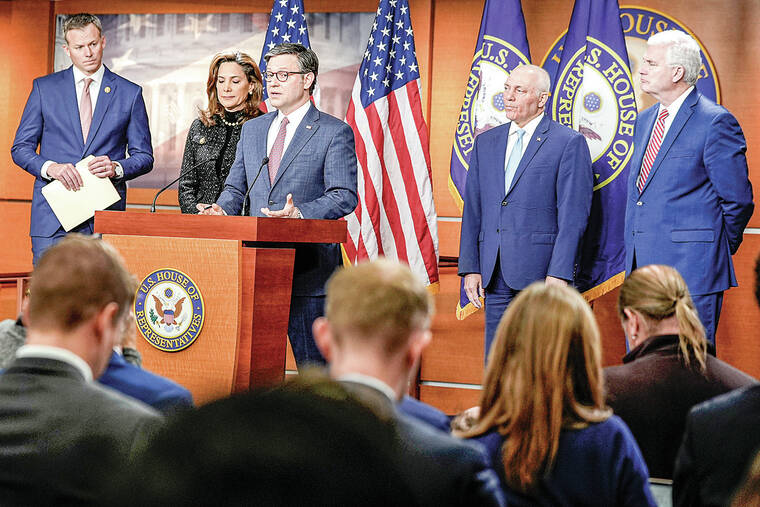House passes reauthorization of key US surveillance program after days of upheaval over changes
WASHINGTON — The House voted Friday to reauthorize and reform a key U.S. government surveillance tool following a dramatic showdown on the floor over whether the FBI should be restricted from using the program to search for Americans’ data.
The bill was approved on a bipartisan basis, 273-147, though it will still have to clear the Senate to become law. The surveillance program is set to expire on April 19 unless Congress acts.
Passage of the bill represented a much-needed victory for Speaker Mike Johnson, R-La., who has been wrangling with conservative critics of the legislation for months. A group of 19 Republicans revolted to block the bill from coming to the floor earlier in the week, forcing Johnson to make late changes to secure their support.
The legislation approved Friday would extend the surveillance program for two years, rather than the full five-year authorization first proposed. Johnson hoped that the shorter timeline would sway GOP critics by pushing any future debate on the issue to the presidency of Donald Trump if he were to win back the White House in November.
Still, the legislation teetered precariously Friday morning as lawmakers voted on an amendment — vociferously opposed by Johnson, the White House and sponsors of the legislation — that would have prohibited the warrantless surveillance of Americans.
One of his top critics, Republican Rep. Marjorie Taylor Greene said that Johnson’s vote against the warrant requirement was another strike against him.
“Basically, what’s the difference in Speaker (Nancy) Pelosi and Speaker Johnson and there’s not one,” the Georgia lawmaker said.
The amendment ultimately failed by the narrowest of margins, in a 212-212 tie. Supporters breathed a sigh of relief as the vote was gaveled to a close.
The vote on the amendment cut across party lines, uniting progressives and conservatives who agree on little else, but have long been skeptical of the government’s surveillance powers.
And opponents of the legislation weren’t giving up. In a surprise move after the vote was closed on the overall bill, a Republican made a procedural motion preventing the legislation from being sent to the Senate. An additional vote will be needed next week.
The legislation approved Friday would permit the U.S. government to collect, without a warrant, the communications of non-Americans located outside the country to gather foreign intelligence.
The reauthorization is currently tied to a series of reforms aimed at satisfying critics who complained of civil liberties violations against Americans.
But far-right opponents have complained that those changes did not go far enough. The vocal detractors are some of Johnson’s harshest critics, members of the ultra-conservative House Freedom Caucus, who have railed against the speaker the last several months for reaching across the aisle to carry out the basic functions of the government.
To further appease some of those critics, Johnson also plans to bring forward next week a separate proposal that would close a loophole that allows U.S. officials to collect data on Americans from big tech companies without a warrant.
Though the program is technically set to expire next Friday, the Biden administration has said it expects its authority to collect intelligence to remain operational for at least another year, thanks to an opinion earlier this month from the Foreign Intelligence Surveillance Court, which receives surveillance applications. But officials say that court approval shouldn’t be a substitute for congressional authorization, especially since communications companies could cease cooperation with the government.
First authorized in 2008, the spy tool has been renewed several times since then as U.S. officials see it as crucial in disrupting terror attacks, cyber intrusions and foreign espionage.
But the administration’s efforts to secure reauthorization of the program have repeatedly encountered fierce, and bipartisan, pushback, with Democrats like Sen. Ron Wyden who have long championed civil liberties aligning with Republican supporters of former President Donald Trump.


